In a race for global enterprises to acquire top AI (Artificial Intelligence) talents, the competition is especially intense amongst tech giants like Google, Amazon, and Samsung. South Korean CEOs also joined this global bid: reportedly, the LG Electronics CEO Cho Seong-Jin will visit Silicon Valley areas to recruit AI talents in person. South Korean Internet company Kakao also joined the battle for AI dominance, by attending a global symposium in San Francisco.
The two core concepts of the Forth Industrial Revolution (4IR), a term first introduced at the World Economic Forum 2016, are hyper-connectivity and super-intelligence. The two keywords that best describe hyper-connectivity are the Internet of Things (IoT) and Big Data. For super-intelligence, it would be artificial intelligence – in consideration of which the global companies’ race for AI dominance is understandable, as they brace for the Fourth Industrial Revolution where the concepts of hyper-connectivity and super-intelligence are expected to play pivotal roles.
POSCO is not exempt from this global competition. What they are specifically focusing on is fostering AI experts from within, so they’re organizing related programs to educate prospective AI specialists. This September, they even organized ‘POSCO Industrial-AI Solution Challenge,’ a contest dedicated to various topics on artificial intelligence. The Challenge was open to the general public.
It seems there is no apparent linkage between a steel company like POSCO and AI technologies, but the three topics POSCO assigned for the AI Solution Challenge suggests otherwise. From predicting the cost fluctuations of steel raw materials, figuring out the timing of big swells in the ocean, to calculating how many lunches to prepare for POSCO employees, the scope of AI technology can be far-reaching.
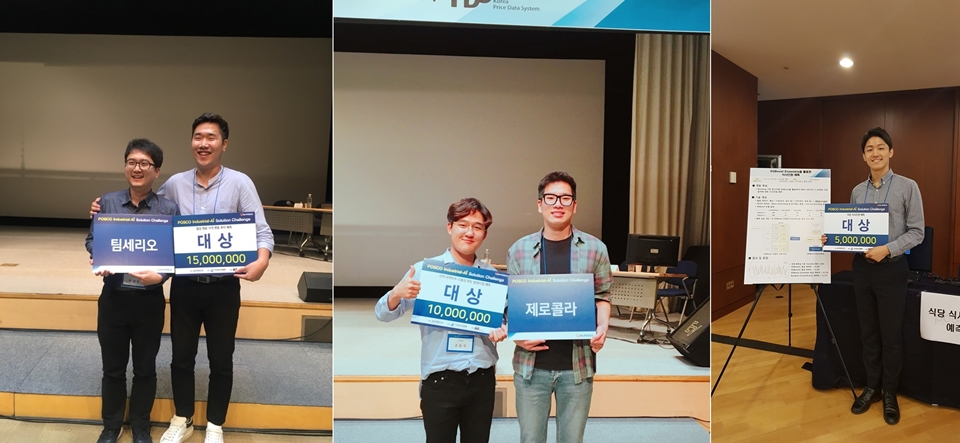
POSCO Newsroom sat with the winners of each challenge category – Team Serio, Zero Coke, and Fast Learner – to hear what they have to say about the contest. All three winners acknowledged the immense potential of AI technology and its applicability to virtually all sectors: AI has no borders.
┃“Braving it out with the AI technology” – Team Serio
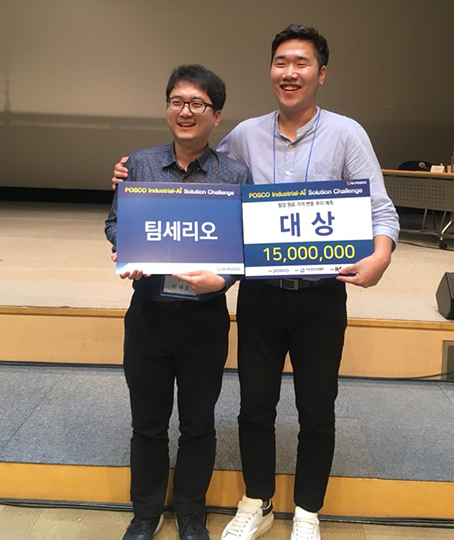
Jae-Ho Lee and Dong-Woo Kim, the two members of Team Serio, are from POSTECH (Pohang University of Science and Technology), working in the same research department. The moment when they saw the contest information on the school bulletin board, they knew. That this would be a great opportunity to implement their classroom knowledge to help solve the pressing issues in the field. So they applied with no hesitation.
When asked why Serio had specifically chosen to predict the cost fluctuation of steel raw materials, Lee replied: “This challenge topic has the most economic impact, and we also thought it was the most versatile model as it can apply to other time series forecast of similar nature.”

To come up with a solution, Team Serio utilized the model DA_RNN (Dual-stage Attention based RNN), based on the human cognitive process. When recognizing a particular object, a person first notices an area of interest around her or him. Then, he or she identifies an object within the area of interest, finally recognizing the specific features of the object. That is the typical process of human cognition.
For Lee personally, the most significant achievement from competing in the POSCO AI Challenge was becoming more assured about the prospects of AI research. “Because of the satisfactory result of our model, I think we can brave it out going forward, applying AI technologies more proactively and widely,” he added.
The POSCO AI Challenge has ended, with Team Serio as the final category winner. Even after the contest, however, both Lee and Kim are still testing various approaches that they couldn’t utilize because of the time constraint. For Team Serio, the clock is still ticking.
┃“A Solution As Refreshing As… Coke Zero” – Team Coke Zero
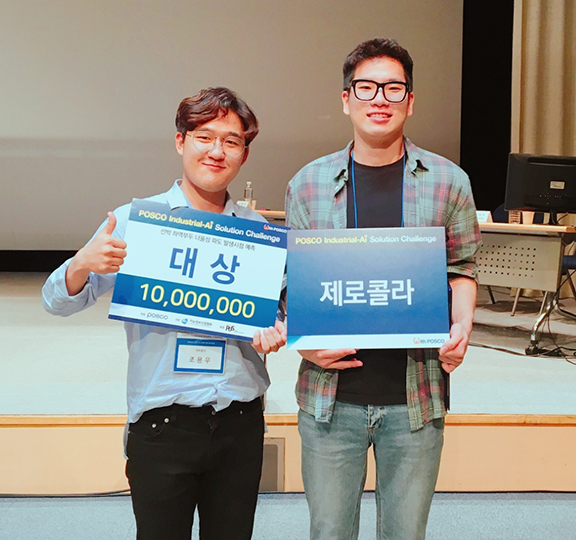
Yong-Woo Cho and Kyu-Soo Han of Team Coke Zero share many interests: they go to the same university. They both major in computer science. They also share the love of… Coke Zero. So it didn’t take long for them to choose their team name. Devising a solution for their challenge topic wasn’t as simple. How did they come up with a solution just as refreshing as their team name, Coke Zero?
For companies like POSCO, ocean cargo shipping is crucial, which is incredibly dependent on wave action. Hence the challenge topic of its AI contest, predicting the big swells. The members of Team Coke Zero who have been studying AI and deep learning since earlier this year found this topic especially intriguing.
To predict the result, they worked with meteorological data from a total of 33 observatories along the coast of the Eastern Sea, from Donghae, Ulsan, Ulleungdo and Dokdo island. The main predictors were water temperature, significant wave height, wave period, wave direction and wind direction. All data were observed at one-hour intervals.
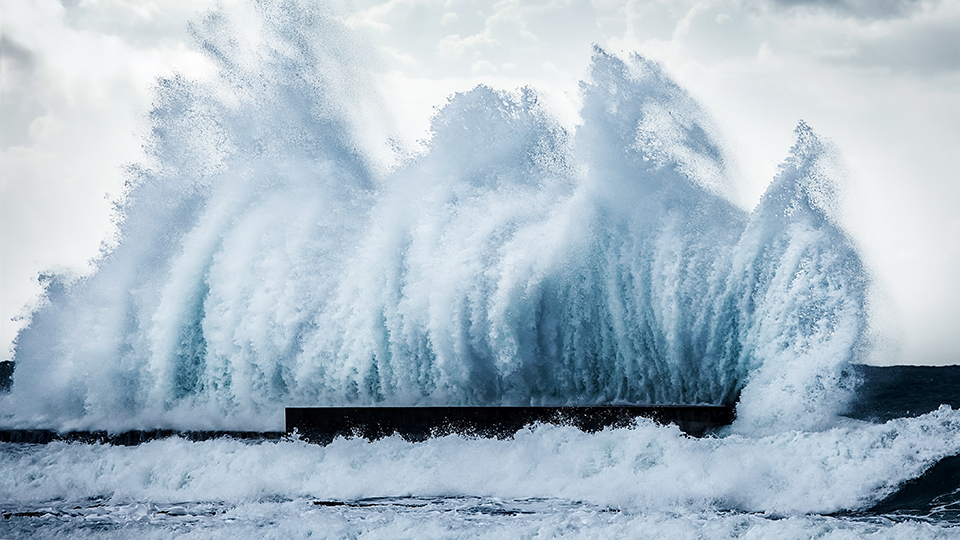
For computer science students like Cho and Han, figuring out the exact causes of big swells was especially challenging. So they built an RSCNN model (Random Shuffle Convolutional Neural Network) to establish the relationships between a total of 248 spatial and temporal predictors. Each model they designed learned a different predictor bundle and the team generated dozens of such models. Through the application of ensemble technique, the team completed a solution predicting either the presence or the absence of big swells in the ocean.
Through the contest, Cho ‘felt more convinced’ about his chosen university major. Coming up with an AI model itself was challenging, but it was also rewarding. He has never had this much fun coming up with solutions for industry challenges. After the contest, Cho is feeling even more dedicated to AI research.
┃“I Taught Myself Artificial Intelligence” – Team Fast Learner
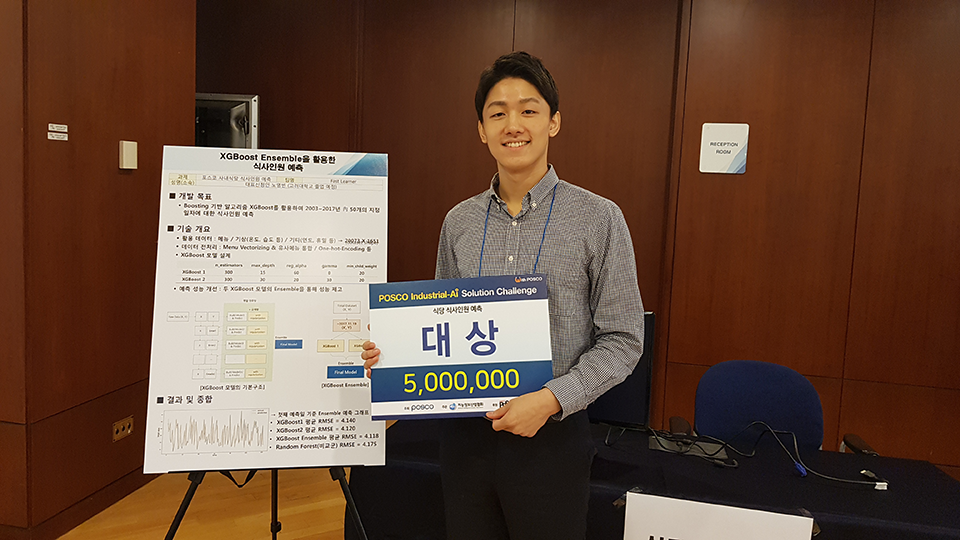
Unlike the other winners, Young-Bin Noh of Team Fast Learner doesn’t come from a science background – he is a Business Management student. He was also a solo contestant with no other teammates. What’s even more surprising was the fact that he studied artificial intelligence on his own. On reasons why he participated in the POSCO AI Challenge, he said that he wanted to receive professional feedback from field experts.
The challenge category Noh had chosen was to calculate how many lunches to prepare for POSCO employees. He chose this topic mainly for two reasons. Firstly, he wanted to practice dealing with text data. Text data mining, aka Natural Language Processing, is widely used and popular, so he always wanted to try his hand at it. Secondly, the challenge category didn’t require much background knowledge. So it was also a practical choice for a business student like Noh.
Noh utilized XGBoost algorithm, which creates hundreds of ‘decision-making trees’ to minimize prediction errors. Decision-making tree is one of the most basic algorithms in machine learning. Like the game of twenty questions, it narrows down the possible answers, ending up with one exact answer at the final stage. To further boost the predictability, Noh employed an ‘ensemble technique’ by creating one more XGBoost.

Noh admits he had to study harder after submitting his proposal, to prepare for the final presentation. The POSCO AI Challenge was an opportunity for Noh to connect with others who were studying data science more creatively. “I enjoyed teaching myself, but I also felt it would be great to learn with others, bouncing ideas off of each other,” he added.
Noh hopes one day the program he developed for the contest can be implemented to help reduce food waste in POSCO cafeteria.
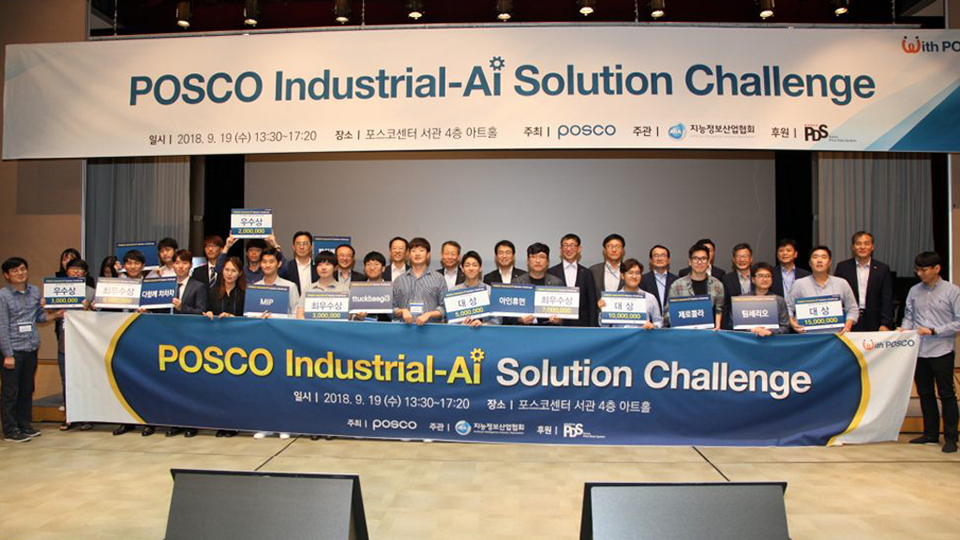
The POSCO Industrial-AI Solution Challenge is now over, but the winners aren’t slowing down. Throughout the contest, they have been running toward the finish line. Now that they have extra time to improve their models, they’re trying to perfect them as best as they can.
The members of Team Serio, Coke Zero, and Fast Learner all said the POSCO AI Challenge was a great learning opportunity, strongly encouraging other AI researchers to participate in similar contests. Simply participating in an actual contest can teach something new, but the contestants can also receive valuable feedback from field experts.
Throughout the interviews, the enthusiastic energy of the young researchers was not only palpable, but also contagious, all of them treating each question with thoughtful consideration. With their dedication, Korea’s AI future seems promising.
